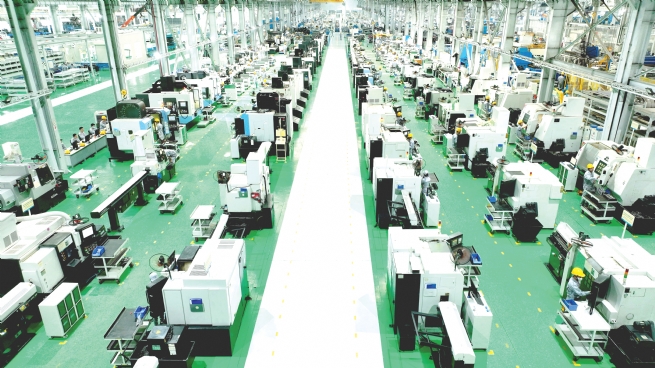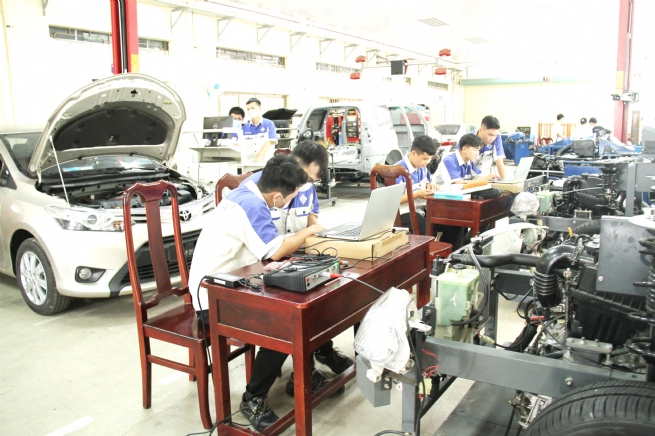Finding Quality Human Resources for Vietnam’s Supporting Industry
The supporting industry in Vietnam is becoming increasingly important in the global supply chain, especially in areas such as electronics, precision engineering, automobiles and textiles. However, one of the main challenges the industry currently faces is the lack of high-quality human resources.

Companies need workers that are skilled in mechanics, electronics, automation, CNC operation, and 3D design
Growing demand for skilled human resources
As Vietnam promotes the development of its supporting industry to increase localization and integrate more deeply into the global supply chain, the demand for high-quality human resources in this sector is becoming increasingly urgent. Enterprises in the supporting industry, particularly those in electronic component manufacturing, precision engineering, material technology, molds and auto parts, have expressed a strong need for engineers, technicians and skilled workers capable of meeting the strict technical standards and production processes of multinational corporations. According to the Vietnam Association of Supporting Industries (VASI), there are about 2,000 supporting industry enterprises nationwide, with more than 300 involved in multinational supply chains, yet most struggle to recruit qualified human resources with high-tech expertise, practical skills and modern production thinking. Companies require not only workers with a solid foundation in mechanics, electronics and automation, but also the ability to operate CNC machines, use 3D design software, control product quality and follow standard processes such as ISO, IATF 16949 or Six Sigma.
A typical example is Truong Hai Group Corporation (THACO), which has around 60,000 employees, with approximately 32% holding university and postgraduate degrees, 18% from technical colleges, and 50% being technical workers. From 2022 to 2025, the company’s demand for human resources is estimated to grow by about 15% per year, in line with its digital transformation strategy and goals for sustainable development. Since 2010, THACO has operated a vocational college with a training capacity of 2,000 students per year, but this still falls short of meeting its needs. As a result, THACO also collaborates with universities, institutes and training centers, and employs experts from Japan and Korea to provide training in technology, engineering and the electronics industry.
In addition, many FDI enterprises with factories in Vietnam are expanding production and require a workforce that can communicate in English or Japanese, understand international corporate culture and quickly adapt to a modern working environment. The demand is not only concentrated in major cities such as Hanoi, Ho Chi Minh City and Da Nang, but also extends to industrial provinces like Bac Ninh, Hai Phong and Dong Nai, where many industrial parks and supporting manufacturing factories are located. However, the current supply of high-quality human resources remains insufficient in both quantity and quality. The shortage of design engineers, high-tech operating technicians and specialized production managers has become a significant barrier to attracting investment and increasing added value for the domestic supporting industry.

Vietnam’s supporting industry faces a challenge in lacking high-quality human resources
Strengthening cooperation between the state, enterprises and training institutions
To meet current demands, Vietnam has many specialized and multidisciplinary training institutions that supply human resources for the supporting industry, including sectors such as electronics, mechanics, automobiles, component manufacturing and logistics. Many universities and vocational schools are proactively partnering with businesses to offer practical training that responds quickly to market needs.
VNU University of Engineering and Technology (VNU-UET), under Vietnam National University Hanoi (VNU Hanoi), is one of Vietnam’s leading technical institutions, with faculties including Electronics &Telecommunications, Mechatronics, Engineering Physics & Nanotechnology, Mechatronics & Automation. The university has many laboratories and research centers, along with international cooperation programs to enhance the training of engineers for supporting industries. Ho Chi Minh City University of Technology (HCMUT) offers programs in Mechanical Engineering; Electrical and Electronics Engineering, Materials Technology and Industrial Management. The university is equipped with modern workshops and laboratories and maintains strong links with domestic and international enterprises, enabling students to gain exposure to real-world production environments and supporting industrial engineering.
In addition, Nha Trang University (NTU), with faculties such as Mechanical Engineering, Electrical & Electronic Engineering, Food Technology, and Transportation Engineering, offers multidisciplinary and applied training programs. NTU educates engineers who can participate in component production, machinery manufacturing, seaport logistics and food processing in the supporting industry, contributing to its ongoing development.
Ho Chi Minh City University of Transport (UT HCMC), a member institution in the logistics and transportation sector, provides training in majors such as Electrical & Electronic Engineering, Shipbuilding, Logistics Management and Information Technology. These programs are well-suited to supporting industrial enterprises involved in the manufacturing of port equipment, ships and transport accessories.
In addition, there are colleges and vocational schools that emphasize practical training in partnership with enterprises. Hanoi Industrial Vocational College (HNIVC) provides students with 70% hands-on training in modern workshops equipped with Industry 4.0 technology from Japan, Korea and Germany. Vietnam College of Industry and Commerce (VCI) applies a “3 in 1” model that connects students, schools and businesses, ensuring 100% job placement for graduates. It offers training in fields aligned with the supporting industry, such as industrial electronics, automotive technology, computer programming and network administration, along with international internship programs in Japan, Korea, Germany and New Zealand.
FPT Polytechnic College adopts the Project-Based Learning method to train students in automation, mechanical-electrical automation, information technology and more. The school guarantees extensive hands-on practice and maintains close cooperation with over 500 enterprises, providing students with internship and job opportunities during their studies.
Faced with the growing demand from enterprises, enhancing skills, expertise and technological adaptability for the workforce has become an urgent task. Close coordination between the state, enterprises and training institutions is essential to developing a workforce that meets the requirements of modernized production, helping improve competitiveness and promote the sustainable development of supporting industries.








